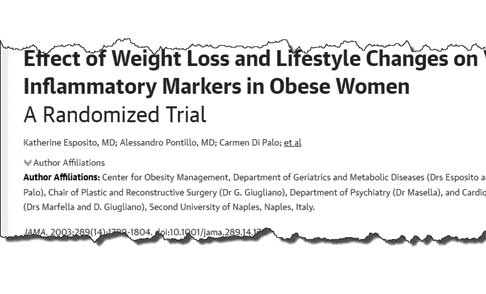
Chronic inflammation shows up in our bodies in all kinds of nasty ways. Heart inflammation, prostate inflammation, joint inflammation, asthma and more are a result of chronic inflammation.
It can even show up in your gums and your teeth.
In fact, if you’re sick in any way, you are probably dealing with chronic inflammation in your body. Illness is often a symptom of inflammation. Not the other way around.
This is something docs often get wrong because they are trained to treat symptoms, not causes.
(I’m a researcher, not a doc. Always consult with your doc for medical advice)
Fix the inflammation and the illness often goes away on its own.
So I’m always interested when I come across research that shows how to reduce inflammation effectively. And this study is particularly interesting.

I know this study is about women, but I think it still holds true for guys because the basic markers for inflammation are the same in both a man’s and woman’s body. What works to reduce inflammation in women will work in men too.
The premise of this study is that losing weight will lead to lower markers of inflammation in the body. And that is what happened here.
A multidisciplinary program aimed to reduce body weight in obese women through lifestyle changes was associated with a reduction in markers of vascular inflammation and insulin resistance.
And interestingly not only were inflammation markers reduced, but insulin resistance was also improved with the weight loss.
But I don’t think weight loss is the whole story here. The evidence points to the idea that weight loss happened because of a reduction of blood fat. And the reduction of blood fat caused the reduction in inflammation.
If you dig a little deeper here, you find this:
Changes in free fatty acids and adiponectin levels were independently associated with changes in insulin sensitivity.
Free fatty acids seem to be the root cause of both insulin sensitivity and inflammation.
Insulin sensitivity is something that is greatly influenced by inflammation in the body.
And the word independent here means that this effect of lowering the blood fat and its influence on insulin sensitivity happened without regards to the weight loss. So lowering blood fat alone led to better insulin sensitivity and lower inflammation.
Interesting, huh?
How the people in this study got lower blood fat is also pretty enlightening.
In this study, the women were given a diet much lower in fat then what they used to eat. Which means:
Eating less fat in your diet creates less fat in your blood.
After 2 years, women in the intervention group had a lower ratio of omega-6 to omega-3 fatty acids, and had lower energy, saturated fat, and cholesterol intake.
While I would never ever eat this fat profile because the PUFAs here are ridiculously dangerous (more on that in a bit). The reality is that the women in this study dramatically lowered their fat intake, which in turn lowered their blood fat.
It works exactly the same way for men. When blood fat is lowered there is lower inflammation in the body.
Lowering the fatty acids in your blood can lead to all kinds of health benefits. Imagine how much better you’ll feel when you have less inflammation and chronic illness. That’s what lowering your blood fat can do for you.
Avoid PUFAs like a needle in the eye
I mentioned earlier that I would never eat the diet that these women were encouraged to eat. Mostly because of the fat profile. PUFAs are pretty much one of the worst things you can put in your body, because they cause huge amounts of inflammation.
PUFAs are polyunsaturated fatty acids and everyone and their brother tells you to eat them.
Things like corn oil, canola oil, soy oil, and all vegetable oils. These oils get rancid when left out and they get rancid in your body. Which is gross.
They are also associated with all kinds of disease. Including prostate cancer.
INCREASED PROSTATE CANCER RISK AMONG MEN WITH HIGH BLOOD CONCENTRATIONS OF OMEGA 3 PUFA [THE KIND FOUND IN FISH OIL, CANOLA OIL, ETC.]. THE CONSISTENCY OF THESE FINDINGS SUGGESTS THAT THESE FATTY ACIDS ARE INVOLVED IN PROSTATE TUMORIGENESIS.
And prostate cancer is just the tip of the iceberg. Study after study shows the kind of crazy damage these oils do to our bodies.
You want to avoid these PUFAs like you would a needle in the eye. That’s how bad they are for you.
Stable fats won’t turn into a sticky, greasy mess in your body
Try a small amount of coconut oil or grass-fed butter instead. These oils stay stable in your body and don’t contribute to the inflammation effect.
Inflammation can lead to all kinds of health problems. But it’s pretty easy to fix.
Reducing the amount of fat in your diet can also reduce the inflammation. Especially if you get rid of PUFAs and replace them with a smaller amount of healthy fats.
You’ll probably also lose weight to boot, just like the women did in this study. Because excess blood fat also leads to weight gain.
But the weight loss isn’t what reduced the inflammation. The lowering the blood fat did.
—————–

- How inflammation and blood fat are related
https://www.ncbi.nlm.nih.gov/pubmed/12684358 - How PUFAs contribute to Prostate Cancer
https://academic.oup.com/aje/article/172/5/566/94206/Diet-Supplement-Use-and-Prostate-Cancer-Risk
- High Blood Cholesterol - National Heart, Lung, and Blood Institute - NIH
https://www.nhlbi.nih.gov/health-topics/high-blood-cholesterol - 11 foods that lower cholesterol - Harvard Health
https://www.health.harvard.edu/heart-health/11-foods-that-lower-cholesterol
